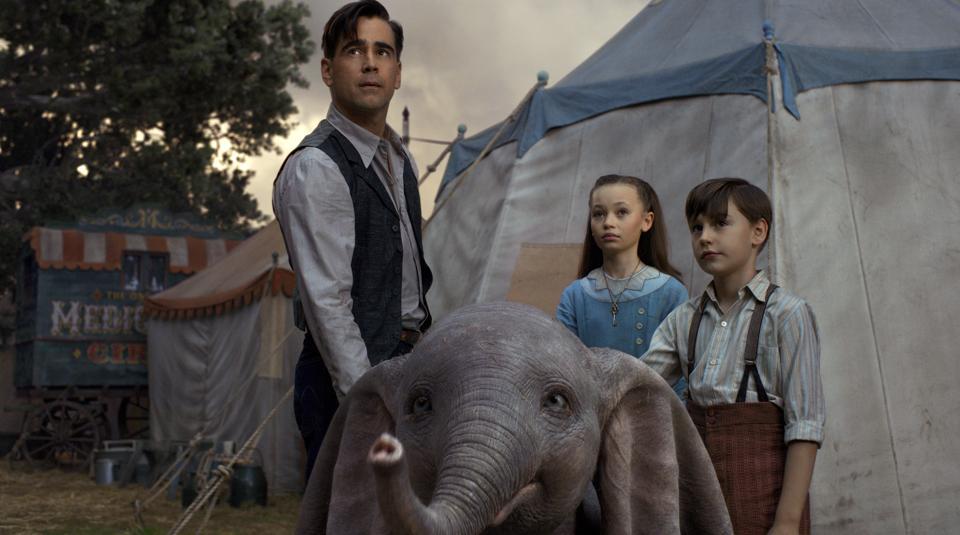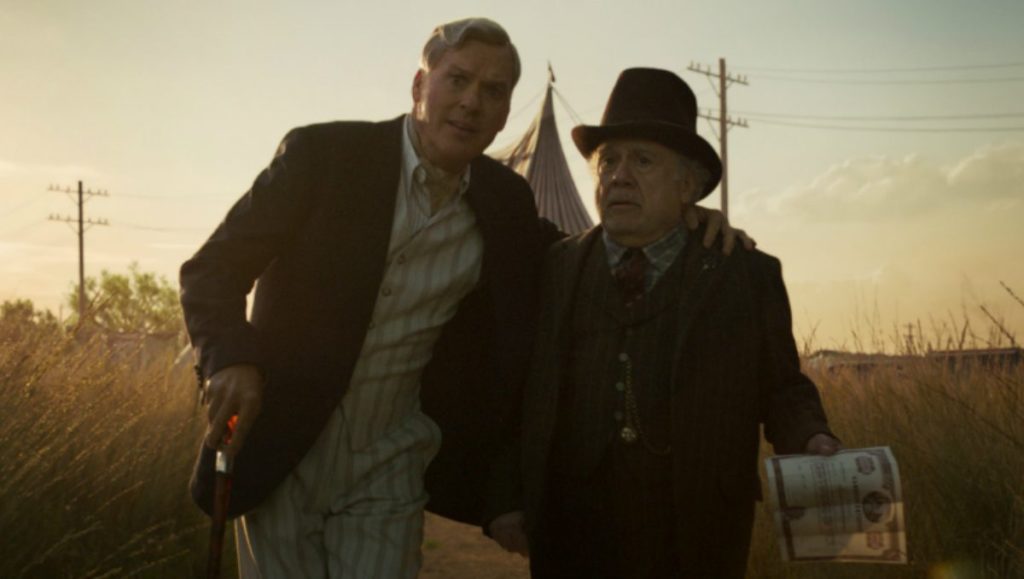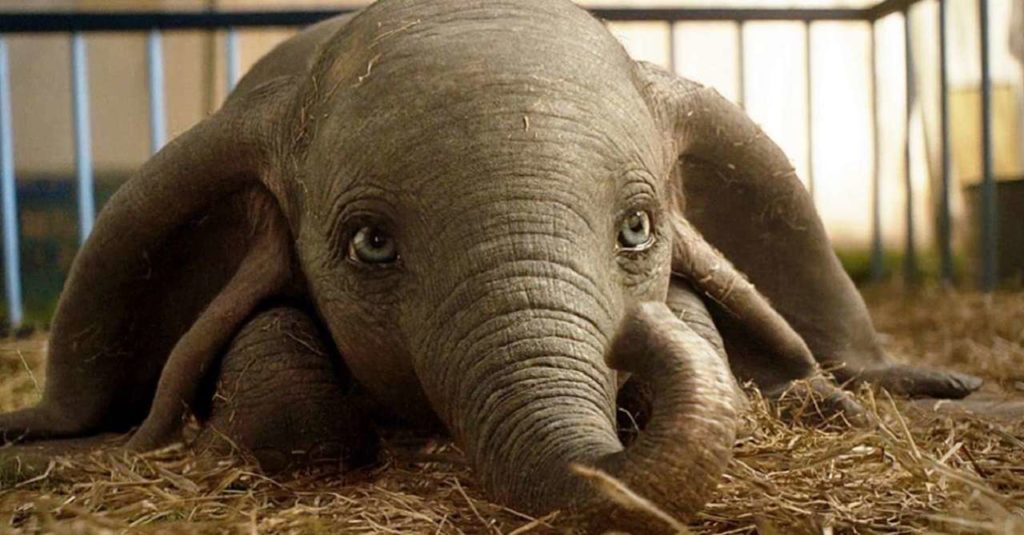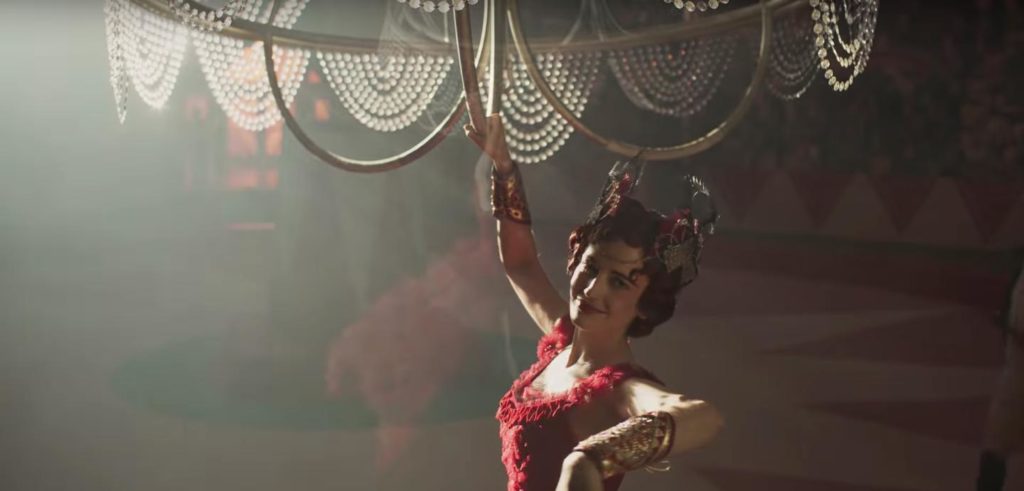
Tim Burton’s Dumbo is a movie about a plucky band of misfits who struggle to reclaim their individuality and artistry while operating under the yoke of an oppressive, profit-driven machine. It is also a live-action remake of a 78-year-old animated landmark, the latest in the continuing assembly line of Walt Disney Studios productions designed to ruthlessly exploit nostalgia for its classic properties, and to churn that nostalgia into a merchandising bonanza. This contradiction is not subtle. When you buy a ticket to see Dumbo, you do not need to possess abnormally large ears to perceive the sound of Disney executives laughing on their merry way to the bank.
That this new Dumbo works as well as it does—that it periodically slips the shackles of dutiful blockbuster adaptation and acquires a frisson of genuine wonder and joy—is a testament to Burton’s showmanship and skill. Now 60 years old, the director rose to fame for his portraits of oddballs (usually portrayed by Michael Keaton or Johnny Depp), which he infused with exotic color and seductive angularity. Age may have blunted Burton’s sharp edges—his last few films, including the underrated Big Eyes, lacked the decisive personality of his early work—but he has remained a capable purveyor of strange spectacle. Here, he is the consummate ringmaster, dazzling you with one illusion after another in a feverish effort to conceal what lies behind the curtain.
There isn’t much to hide. Dumbo attempts to expand on the legacy of its predecessor—it’s 48 minutes longer, for one—but it doesn’t provide much in the way of compelling drama. Most of the characters are one-dimensional, either valiant heroes or snarling villains. The dialogue is wooden, while the story is predictable. (The script is by Ehren Kruger, best known for his screenplay for The Ring; he also has the ignominious distinction of owning the most writing credits for Transformers films, with three.) The themes—believe in yourself, embrace the unusual, fight the power—are stuffy and familiar, and their tackiness is exposed in a singularly unpersuasive denouement.

These flaws would seem to combine to form a bad movie. Yet somehow, Dumbo is not bad—or at least, like some devious magic trick, it camouflages its bad elements into looking good. It may be a fundamentally soulless enterprise, but it is also a sweet and stirring tale of perseverance, told with splendor and flair. And so, what is hoary becomes fresh, what is trite becomes sincere, and what is maudlin becomes poignant.
It’s an uncanny move, though it takes some time to get in motion. The opening stretch of Dumbo—which is set in 1919 and focuses on the return of veteran equestrian Holt (a characteristically soulful Colin Farrell), who is missing an arm but is armed with a tolerable Kentucky accent—is stiff and tedious. Burton tries to locate some complexity in Holt’s relationship with his preteen children, Milly (Nico Parker) and Joe (Finley Hobbins), but their tentative rapport isn’t explored in sufficient detail to be impactful. Nor is Burton’s initial depiction of the traveling circus, which Holt used to ride horses for, especially evocative. We meet the impresario, Max Medici (Danny DeVito), who growls and bellows and complains in much the same way that DeVito’s carny barker did in Big Fish. His assemblage of meager talent includes a strongman, a fake mermaid, and a snake charmer, all of whom contribute to the film’s ethos of venerable eccentricity but none of whom possesses an actual personality.
That instead is left to Dumbo, the adorable baby elephant with enormous ears and expressive, computer-generated blue eyes. Dumbo is hardly the first big-budget feature to lavish more attention on its special effects than its human characters, but it’s nevertheless telling how Burton conjures the mammal with such care and intimacy, as though he’s shepherding a kindred soul whose talents are dismissed and misunderstood. As a childlike creature of tenderness and vulnerability, Dumbo instantly commands our sympathy, but he also carries a tactile beauty, the way his skin ripples and folds as he lumbers across the screen. He’s an attraction worth paying to see.

And indeed, once Medici discovers that Dumbo can fly—thanks to a feather, a sneeze, and Milly’s rigorous adherence to the scientific method—the film finally takes off. Dumbo’s first major set piece, which finds the baby mastodon battling heights, flames, and a savage crowd, is a triumph of big-screen filmmaking, an exuberant tribute to the power of flight and the thrill of self-discovery. As Dumbo swerves round and round the big top, accompanied by Danny Elfman’s swooping score, Burton taps into a true sense of wonder, unsullied by irony or ego. With digital code and human admiration, he reminds us that movies can soar.
Dumbo falls back to earth quickly enough, twisting itself into a shrill parable of corporate cruelty. The elephant’s aerial exploits trigger the arrival of V.A. Vandevere (a scenery-chewing Keaton), a slick entrepreneur with a bejeweled cane and a coiffed silver wig. Murmuring sweet nothings of profit and luxury to Medici, Vandevere uproots the circus from its shambling rural environs and installs it in his own extravagant theme park, which bears the bitterly ironic name of Dreamland. It’s marketed as a place of childish whimsy and imagination, but it also proves to be a haven for avarice and barbarism.
The ensuing struggle—which pits Holt, Dumbo, and the spunky Medici crew against Vandevere and his army of unfeeling minions (Alan Arkin shows up as a dubious banker)—is clunky and didactic. But it isn’t without its pleasures, its visual flourishes and grand sights. The grandest of these is not the smartly constructed sets, or the lovingly rendered animals, or even the enchanting display of carefully blown bubbles that precedes one of Dumbo’s fateful flights; it is instead Eva Green, playing a trapeze artist named Colette (no, not that one), who initially appears to serve as Vandevere’s velvet glove but who soon becomes Dumbo’s trembling partner in show business. Working with Burton for the third time (Dark Shadows, Miss Peregrine’s Home for Peculiar Children), Green brings considerable intelligence to a relatively small role, imbuing her brave performer with glimmers of indecision, affection, and humanity.

Those qualities are missing from the rest of Dumbo’s characters, who form a dull spectrum of unidimensionality. (One particularly nasty handler appears to have been lifted from a grade-school comic.) Yet the movie’s second half remains oddly irresistible, both for the vivacity of its set pieces and the gentleness of its silent hero. Our large-eared elephant is easy to root for, not only because of his extraordinary athletic gifts but because of his fear and his guilelessness. He may be the star of the show, but Dumbo is also a patsy.
And what is Dumbo? It is simultaneously an anti-corporate screed and a polished product of commercial calculation. That incongruity can be ungainly, and as seamless as Burton may be with the film’s special effects—the removal of Farrell’s left arm is entirely invisible—his stitching of its narrative elements proves less graceful. But his heart is in the right place, and every so often, his commitment to corny decency combines perfectly with his inveterate command of cinematic language, allowing this earnest, awkward movie to take wing.
Grade: B-
Jeremy Beck is the editor-in-chief of MovieManifesto. He watches more movies and television than he probably should.
